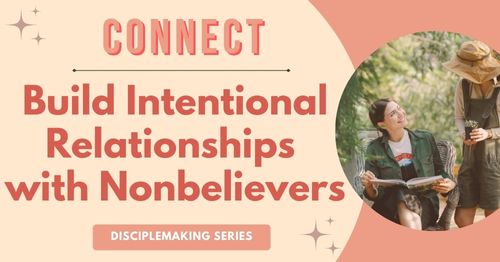Connect • Build Intentional Relationships with Nonbelievers

AI was not used to generate this post.
Do you know the Bible well but have difficulty interacting with the nonbelievers around you? Do you depend on the church staff to not only reach the community but to also teach each person who comes through the door? Now is the time for you to become a Christ-follower not only in your personal walk of faith but also in disciplemaking. Jesus commissioned His followers to make disciples for Him. He demonstrated how to do this while He was on earth. It was part of His lifestyle, and He wants it to be part of our lifestyle, too. In this series of articles, I will share with you what it means to be a disciplemaker and give you helpful tools so that you can live intentionally as a disciplemaker in your daily life. This is post #2 in our “Lifestyle Disciplemaking” blog series, adapted from our book, Leap into Lifestyle Disciplemaking.
Key Takeaways
- Disciplemaking is not a program; it is a lifestyle that reflects Jesus’ teachings and mission.
- Every believer can become a disciplemaker by building intentional relationships with nonbelievers.
- To start disciplemaking, pray for nonbelievers in your life and make an effort to connect with them.
- Jesus modeled building relationships with those who needed to know Him, encouraging us to step out of our comfort zones.
- Engage actively with nonbelievers by showing compassion and love, reflecting God’s love through your actions.
Listen to this blog as a similar podcast:
Disciplemaking is a lifestyle, not a program
Disciplemaking is a ministry lifestyle. It is not a program. It is mirroring what Jesus did with His own followers as He taught them how to connect with those who are not Christians, share the gospel with them, establish new believers in their faith in Christ, and show them how to become disciplemakers, too.
Disciplemaking is going beyond personal discipleship. We use the word “discipleship” to refer to the normal process for Christians to get established and grow in their faith (Sunday sermons, Bible studies, classes, and small groups). Disciplemaking is the full process of seeing people come to faith in Christ, grow in Him (discipleship), and then being equipped to help others through the same process (disciplemaking).
Christian women who are following Jesus can live intentionally to connect with nonbelievers, personally establish believers (new and growing) both inside and outside the church, and equip them to engage other nonbelievers and establish new believers. That is making disciples who make disciples who make disciples.
Who can do this? Every woman can become a disciplemaker–teens and college students, senior adults, singles, married, widowed, moms, empty nesters. Take what you have learned already (discipleship) and take someone else through that process (disciplemaking). Not everyone will become a leader, but every believer can become a disciplemaker and choose a lifestyle of disciplemaking. Jesus showed us how to do this.
Jesus built intentional relationships
Disciplemaking starts with getting to know those around you who are nonbelievers. A nonbeliever is someone who does not know Christ yet! She may want to know Him but does not know how. She may not know enough about Him to want to know Him. But we know God desires her to know Him. So, if we look at those around us as women who want to know Jesus but do not know how, we can have compassion and courage for helping at least one to know Him. This will require us to be strategic in how we help her as Jesus was strategic.
Jesus intentionally went to those who needed to know Him.
Throughout His three and a half years of ministry, Jesus intentionally went to places where the people were who needed to know Him. He did not let people keep Him in one community to benefit from His presence.
At sunset, the people brought to Jesus all who had various kinds of sickness, and laying his hands on each one, he healed them. Moreover, demons came out of many people, shouting, “You are the Son of God!” But he rebuked them and would not allow them to speak, because they knew he was the Messiah. At daybreak, Jesus went out to a solitary place. The people were looking for him and when they came to where he was, they tried to keep him from leaving them. But he said, “I must proclaim the good news of the kingdom of God to the other towns also, because that is why I was sent.” And he kept on preaching in the synagogues of Judea. (Luke 4:40-44)
The situation just referenced occurred in Capernaum after Jesus healed Peter’s mother-in-law. Notice what the townspeople wanted to do—keep Him from leaving them. They wanted to have their own community healer. Where is the concern for those in other communities who needed His healing power? Jesus, however, knew that His mission was to go to other towns and “proclaim the good news of the kingdom of God.” He knew His purpose.
As I mentioned in “The Call to Lifestyle Disciplemaking,” we can get very cozy and comfortable hanging out with Christians all the time. That is like keeping Jesus to ourselves. We need to resist that temptation and understand that our purpose is the same as His—go to others outside of our community and proclaim the good news of the Gospel.
Jesus built relationships with anyone interested in Him.
Jesus built relationships with those who were interested, and He was known as a friend of sinners.
After this, Jesus went out and saw a tax collector by the name of Levi sitting at his tax booth. “Follow me,” Jesus said to him, and Levi got up, left everything and followed him. Then Levi held a great banquet for Jesus at his house, and a large crowd of tax collectors and others were eating with them. But the Pharisees and the teachers of the law who belonged to their sect complained to his disciples, “Why do you eat and drink with tax collectors and sinners?” Jesus answered them, “It is not the healthy who need a doctor, but the sick. I have not come to call the righteous, but sinners to repentance.” (Luke 5:27-32)
Jesus recognized that Levi (aka Matthew) was interested in following Him. Jesus invited Levi. Levi said “Yes!” Then, Levi held a party and invited all his tax collector friends. His life had been changed, and he wanted his friends to meet the reason. What a great excuse to throw a party!
Apparently, he had a house full of coworkers! I always want to ask the question, “What made them want to come?” Tax collectors were known to be greedy and charged the Jewish people far more than what was owed. They were in cahoots with the Romans. All of that made them despised. But no one is beyond the power of the Gospel.
From Luke’s gospel, we know that tax collectors had already shown an interest in wanting a new life by going out to hear John the Baptist and get baptized by him (Luke 3:12-13). They were spiritual seekers. What did they have to lose? Nothing! They were already shunned by the “religious” community because of their lifestyle. Maybe not all the tax collectors who came to Levi’s house decided to follow Jesus, but enough were interested in listening to Him. If someone was not talking about God’s true way of approaching life, how would they otherwise know?
This is what is said about those who responded:
All the people, even the tax collectors, when they heard Jesus’ words, acknowledged that God’s way was right, because they had been baptized by John. (Luke 7:29)
Now the tax collectors and sinners were all gathering around to hear Jesus. (Luke 15:1)
To those who wanted to know more about Him, Jesus gave them more teaching. He even used tax collectors in His parables representing those who knew they needed God and were seeking Him though the “religious” people avoided them. Besides Levi, Zacchaeus was also a tax collector who turned his life around when Jesus entered his life. He was hungry for a different kind of life. Jesus met him there in his need (Luke 19:2-8).
For more help with this, read my article, “Live a Question-Stimulating Life in View of Your Neighbors.”
Jesus invited people to join Him on His mission.
Jesus invited people to join Him in His mission. For some, that meant they were to travel with Him. For others, they were to go back home and share about Him with their family and neighbors.
In a non-Jewish region on the eastern side of the Sea of Galilee, Jesus healed a severely demonized man. How do you think the healed man responded? The same as you and I would.
As Jesus was getting into the boat, the man who had been demon-possessed begged to go with him. Jesus did not let him, but said, “Go home to your own people and tell them how much the Lord has done for you, and how he has had mercy on you.” So the man went away and began to tell in the Decapolis how much Jesus had done for him. And all the people were amazed. (Mark 5:18-20)
Of course, the grateful man wanted to stay close to Jesus and hang out with the other disciples. But Jesus gave him a mission. “Go to those who have not met Me and tell your story so they can know Me, too.” The healed man obeyed Jesus and told his story not just to one person but to many. “And all the people were amazed.”
The evidences of human distress are everywhere around us. Women are in bondage to guilt, fear, destructive behavior, and fatigue due to the burden of responsibilities. Erroneous views of God leave them feeling empty, confused, and without meaning and purpose. Failure in relationships produces a sense of rejection, worthlessness, and extreme loneliness. Jesus Christ’s plan to meet that need for every woman is Himself. And He invited you to join Him on that mission.
Jesus went through all the towns and villages, teaching in their synagogues, proclaiming the good news of the kingdom and healing every disease and sickness. When he saw the crowds, he had compassion on them, because they were harassed and helpless, like sheep without a shepherd. Then he said to his disciples, “The harvest is plentiful but the workers are few. Ask the Lord of the harvest, therefore, to send out workers into his harvest field.” (Matthew 9:35-38)
Do you desire to be a laborer for the harvest? I hope your answer is “Yes!” You and I need to join Jesus in the mission to build intentional relationships with those who do not know Christ or do not know Him well. As I mentioned in “The Call to Disciplemaking,” Jesus’ example in the gospels reveals to us that lifestyle disciplemaking is an intentional, relational process flowing from a love for God and love from God for people. We will start getting ready for lifestyle disciplemaking with something simple—learning how to love people.
Loving people
God’s love for people given to you
Do you love God? Then, you know that He loves people. That is why He came to earth to live as a human and become the sacrifice that makes it possible for us to have an unbroken relationship with the God who loves us dearly. You can read more about this in my article, “The Gospel: God’s Cure for Our Sin Disease.”
Because our God loves people, He calls us to join Him on mission to reach people who need to know His love. We enter into that mission when we consider what life is really like for those around us who do not know Jesus yet. Throughout this series, we will refer to anyone who has not trusted in Christ yet as a nonbeliever. The Bible describes nonbelievers as living in blindness and darkness. Have you thought about what life is like for the nonbelievers around you? Do you even care?
I read this quote several years ago. It stunned me.
If we are not careful, the busyness of life will lead to intentional blindness. (unknown source)

Have you developed some intentional blindness like the girls in the picture above? I know I have. In fact, I was once ignored while visiting a new group of Christians! Two of the women who were leaders in the group introduced themselves to me then turned away and spent the next five minutes visiting with each other. They left me just sitting alone at the table—a newcomer. Awkward. Intentional blindness. Is that how the nonbelievers in your circle of acquaintances feel?
Who are the nonbelievers in your life?
Who are the nonbelievers in your life? Where do you frequently see them? Start with where you are presently connected: School, gym, sporting events, coffee shop, work, family, neighborhood, retirement center, hair stylist, volunteer activity, book club, community classes, and your children’s friends. Some we think are nonbelievers may be believers who have never been established in their faith so their lives look like those of nonbelievers.
Ask Jesus to give you His love for them and to help you understand what they are feeling and needing from Him. Ask Him to make you want to step into their lives as a means of displaying Jesus’ love and compassion to them. Ask Him to give you a desire to get out of your comfort zone with other Christians and connect with nonbelievers in order to build a relationship. Ask Him to help you go from having good intentions to being intentional—deliberate, strategic—at building relationships with nonbelievers.
Invite your close Christian friends to join Jesus on mission with you. Do this together. Where could you and a Christian friend go together to connect with unreached women? Jesus took His friends with Him when reaching those who were outside His group of disciples. You are more likely to commit to lifestyle disciplemaking when you have a partner or two.
Pray and love
Where do you begin this lifestyle disciplemaking adventure? I suggest you start with “Pray and Love.”
“Pray and Love” simply means you intentionally pray for those with whom you are trying to connect and watch where God might use you in their lives. Ask Him to lead you to begin an intentional relationship with at least one. Ask the Lord to make your love increase for others around you.
May the Lord make your love increase and overflow for each other and for everyone else, (1 Thessalonians 3:12)
Remember this truth as you pray:
Evangelism is not about you involving Him in your outreach efforts. It is He involving you in His. Only the Holy Spirit can open the eyes of unbelievers to the truth of the gospel…It is the job of believers to communicate the gospel. It is the job of the Holy Spirit to convert the heart. (David Souther, EvanTell)
Here is how “Pray and Love” works:
- Ask Jesus to bring to mind 1-2 nonbeliever or unchurched women in your life. Consider those whom you frequently see or where you are presently connected. Some we think are unbelievers may be believers who have never been discipled so their lives look like those of unbelievers. Put these names on your Pray and Love list. Download this Pray and Love bookmark for ease of keeping track of the women on your list.
- Pray for each one whenever you think about her or see her. John 6:44 says this, “No one can come to me unless the Father who sent me draws them.” So you can pray: “Father, please send the Holy Spirit to work in the heart of __ (her name) __ to draw her to Jesus so she will trust in Him.” Continue praying that whenever you think about or see that person, envisioning the Holy Spirit working in her life to draw her to Jesus. Remember what drew you to Jesus and what triggered your need for Him.
- Ask Jesus to give you His love and compassion for her and to help you understand what she is feeling and needing from Him. What fills her time? What are her struggles? What concerns her heart? Think about her felt needs. Step into her life to display Jesus’ love and compassion to her. Example: “Lord, compel me to love her well so that I cannot wait to be able to spend time getting to know her.”
- Commit to make the most of any connection you have to build a relationship with her. Think of when and how you might get together with her.Consider what is convenient for her. What could you do together for fun? Plan a time to meet with her. Make good intentions become intentional and relational. Reminder: Do not act shocked by her language or behavior. Love her where she is.
- Trust in Jesus tohelp you see where the Spirit might use you in her life while you live dependently on His power to introduce her to Jesus through your relationship with her. Join Him as you watch what He is doing.
Download the “Prepare to Share” booklet which includes this Pray and Love process.
Let me put in a word of caution here. Love her even if she never trusts in Christ or if someone else leads her to Christ. Do not let her think she is your project or another “to-do” on your list. She will see right through it and distrust your concern for her. The purpose of praying and loving is to draw them to Jesus. You represent Christ to her. Leave it there. Only God can give us His great love for that woman so that we want to love her well, to build a relationship with her, and to consider it a joy in your life to know her.
Out of 100 [people], one will read the Bible, the other 99 will read the Christian. (Dwight L. Moody)
As she “reads you,” she will read God’s love for her. Asking our gracious God to give you His love and compassion for the nonbelievers around you is where disciplemaking starts.
Make room in your life
Like you, I am busy with life that includes my family, my work at home and outside, and my church life. I am learning that if I do not intentionally reach out to one of the women on my “Pray & Love” list and make arrangements to get together with her, weeks go by without any friendship-building really happening. It is not just enough to think about it. I must actively pursue this new lifestyle of intentional friendships with nonbelievers.
I heard pastor Chuck Swindoll say this in a radio broadcast,
You must give up your convenience to reach people for Christ.
That is so true for me. It is likely true for you as well.
To be a disciplemaker, you must leave some room to get together with your 1 or 2 nonbelievers as often as possible. If your lives already intersect (sport teams, work, story time at the library), determine to sit with her at practice and games, ask her when she could meet you outside of work time, or invite her to lunch after story time. Think strategically in the midst of what you are already doing. Show her that she has value to you and to God. As a friend of mine often says, “Love them until they ask why.”
Get out of your comfort zone
In Luke 14, Jesus was invited to lunch with a bunch of Pharisees and lawyers. Deliberately placed in front of Jesus was a sick man, and it was a Sabbath. Of course, Jesus healed the man, then proceeded to challenge the listeners’ concept of compassion followed by a lesson on outreach. That is what caught my notice:
Then Jesus said to his host, “When you give a luncheon or dinner, do not invite your friends, your brothers or sisters, your relatives, or your rich neighbors; if you do, they may invite you back and so you will be repaid. But when you give a banquet, invite the poor, the crippled, the lame, the blind, and you will be blessed. Although they cannot repay you, you will be repaid at the resurrection of the righteous.” (Luke 14:12-14)
I know Jesus was addressing the religious leaders’ pride and lack of compassion. But He was also addressing their comfort. It is just more comfortable to spend time with likeminded people (in our case other Christians) rather than those who are spiritually poor, crippled, lame, and blind. Jesus needs to kick us out of our comfort zone, too. How many dinners do we host when we invite the spiritually poor rather than the spiritually rich—personally and in our church women’s ministry events?
Jesus continually challenges my thinking about this. We who are spiritually rich in Christ just need to do a better job of connecting with those (the spiritually poor) who need to know Him. In order to be a “Lifestyle Disciplemaker,” you and I need to commit ourselves first to Jesus as the sent ones—sent by Him to “my world.” It means depending upon Him to make that desire in us so strong that we will “see” the ones He wants for us to befriend. It means purposefully giving ourselves (time, love, energy) to them as we live each day and week. That is lifestyle disciplemaking. Who is the one Jesus wants you to befriend this year?
Get our “Lifestyle Disciplemaking” newsletter. Click on this link and choose “Interested in lifestyle disciplemaking” as your experience level. You will receive weekly tips and encouragement for disciplemaking in your life, including stories of what others are doing.
Stay Christ-focused as you take the next steps
Disciplemaking is the Lord Jesus Christ’s idea and commission to all of His followers. What He calls us to do, He enables us to do through His Spirit at work in us and in the world.
Ask Jesus to give you His love for the nonbelievers around you and to help you understand what they are feeling and needing from Him. Ask Him to make you want to step into their lives as a means of displaying Jesus’ love and compassion to them. Ask Him to help you go from having good intentions to being intentional at building a relationship with at least one of them. You can say, “Lord, compel me to love her well so that I can’t wait to be able to spend time getting to know her.” Ask for courage, love, and whatever else you need from the Lord to be a good news bearer to the woman you just identified in your life. Pray for God to draw her to Jesus.
When the Holy Spirit gives you opportunity to talk to her about Jesus, you need to be ready. We will talk about what you can do to “Prepare to Share” in a future blog. For now, I will share an easy way to get started connecting with newcomers to your church activities, many of whom are unchurched women who know they have a spiritual need but not sure what to do about it.
Read all our articles in the lifestyle disciplemaking series. You can the next blog and find out what it means to become a designated engager.
Let Jesus lead you into lifestyle disciplemaking. Jesus followers become disciplemakers.
Lifestyle disciplemaking activities are interwoven throughout our Live Out His Love Bible Study of New Testament women and our Leap into Lifestyle Disciplemaking book.
-
Live Out His Love (NT Women)—paperback
$16.00 -
Live Out His Love (NT Women)—printable / fillable
$10.00 -
Live Out His Love (NT Women)—digital reader version
$4.99 -
Leap into Lifestyle Disciplemaking—paperback
$14.00 -
Leap into Lifestyle Disciplemaking—printable
$10.00 -
Leap into Lifestyle Disciplemaking—digital reader version
$4.99
Image credit: sourced from a template at canva.com. Girl being ignored is an open source image downloaded from the internet.
AI was not used to generate this post.





